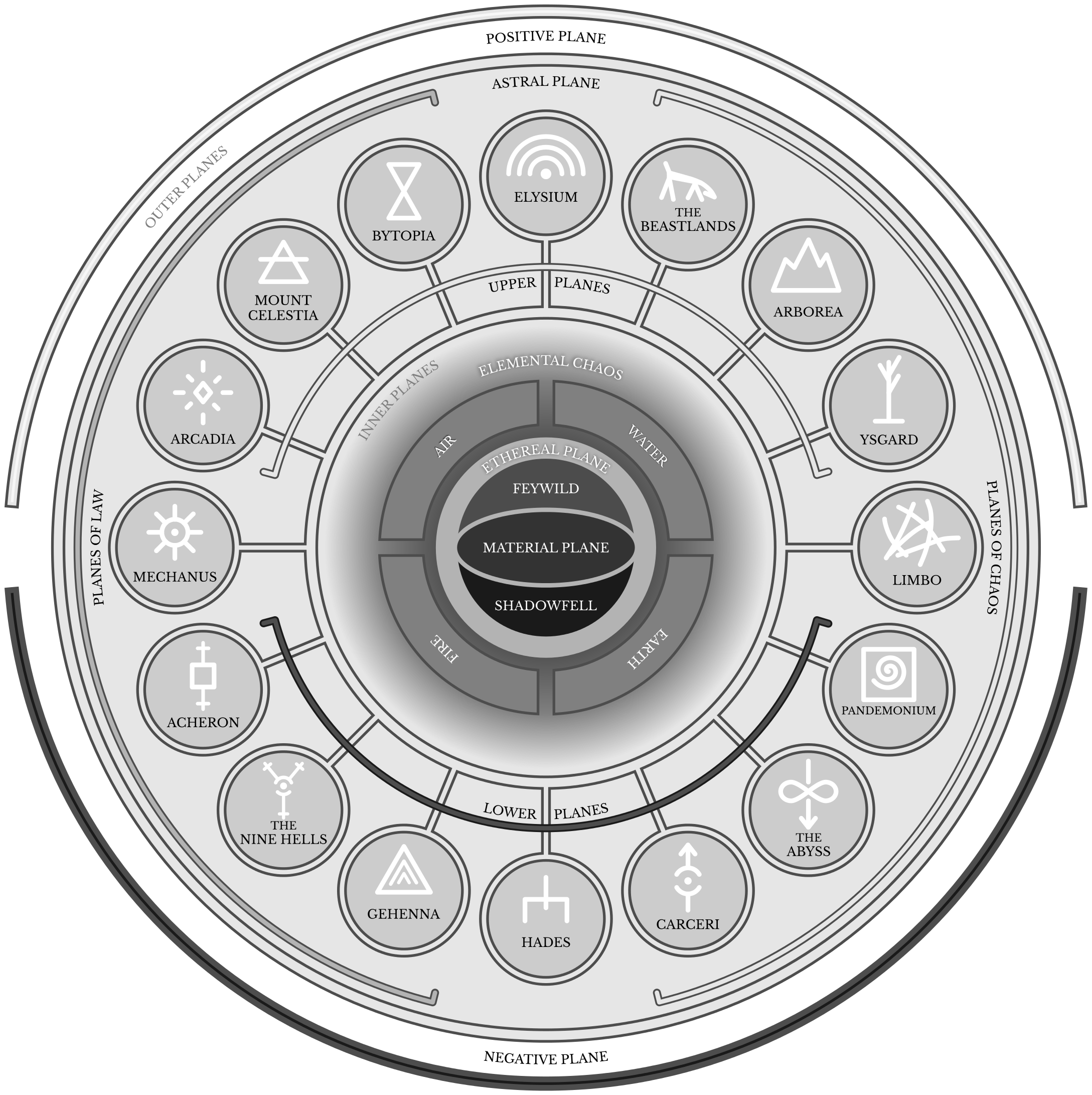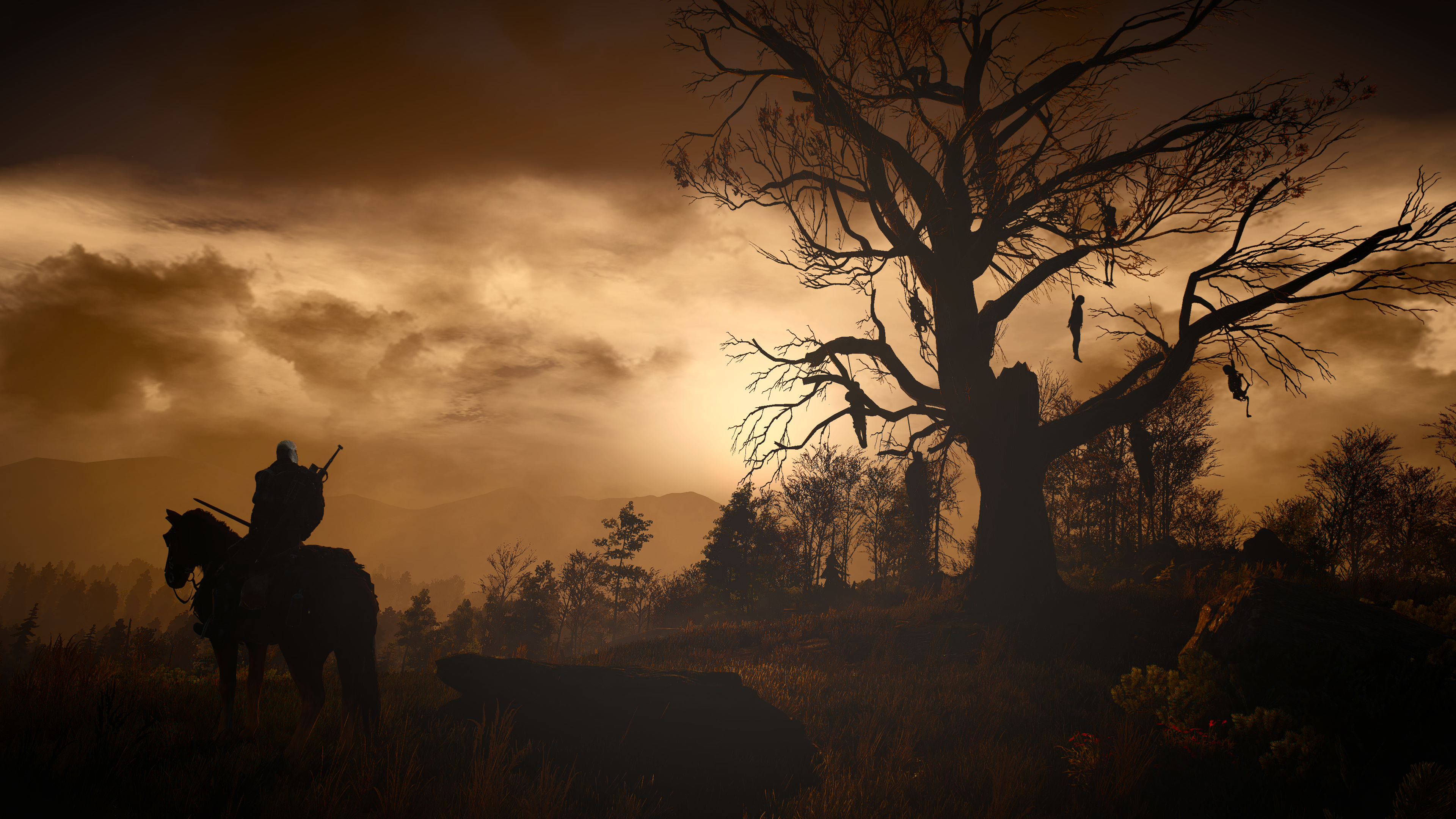Premise
What happens when the different planes of existence occasionally come in contact with each other, where the fabric between the planes tears and allows passage from one plane to the next? What if hordes of demons are working from the Nine Hells and the Abyss to tear open the thin membrane to pass through and wreak havoc and dominate the prime material plane? What if Elysium and the Seven Heavens are working to prevent this? Celestial beings are fighting infernal ones and the prize is dominion over the prime material plane. The celestial forces are more powerful, but far fewer in number. The infernal forces are numerous, but infighting and backstabbing undermine their efforts.
The bleak atmosphere of The Witcher and Ravenloft. The Celestial vs Infernal clash of In Nomine and Diablo. The planes of Planescape.
The Outer Planes
The Conjunction of Planes is a concept lifted from The Witcher’s Conjuction of Spheres. But then using the outer planes model that’s used in D&D.
| Outer Planes | ||||
|---|---|---|---|---|
| Celestia | Bytopia | Elysium | Beastlands | Arborea |
| Arcadia | ↑ Good ↑ | Ysgard | ||
| Mechanus | ← Lawful | Outlands | Chaotic → | Limbo |
| Acheron | ↓ Evil ↓ | Pandemonium | ||
| Baator | Gehenna | Hades | Carceri | Abyss |
Setting
While it’s tempting to use the Forgotten Realms as the setting, there is too much canon to ignore. We can simply use the outer planes that are commonly used in all D&D settings (adjusted to suit the setting) and build a setting around it.
It would likely start with a rather generic fantasy trope familiar like we see in The Witcher, Lord of the Rings and Game of Thrones, set in a medieval European inspired land set with elves, dwarves, halflings, orcs, ogres, gnolls, etc. In that sense it is not dissimilar to the Forgotten Realms. The big difference is that magic will be far less prevalent than in FR. Magic is potent, but dangerous. Magical items are artifacts from a bygone age and only a select few people have a true grasp of magic and they guard their secrets closely. Common folk are superstitious, follow a pantheon of different gods, deities and powers. They appeal to witches, crones, druids, hermits and pellars to grant them health and good fortune, but fear them in equal measure.
An adventurer who is magically gifted, either with nature (rangers, druids), divine (priests, clerics, paladins) or arcane (wizard, sorcerer, warlock, witches, warlocks, shamans) magic, is a rarity. Warriors, archers and rogues generally found their comeuppance as a soldier in one of the many wars, as a mercenary in one of the numerous companies, or on the cut-throat alleys of the larger cities. The fact that they survived their battles in order to strike out on their own is proof of their exceptionalism.
Character Types and Backgrounds
I think it could be very useful to suggest to players that they should consider a character background where they are somehow an outsider and not part of the establishment. Whether that means that they are magically gifted and therefore both feared and respected, or because they always had a different outlook on life than their brothers and sisters of whatever order they belonged to, there needs to be a good reason why they leave the comfort of numbers and venture out into the world by themselves as adventurers. This is a world where only the gifted and exceptional can make their own way, while others have to band together behind walls and in towns, villages and farming communities. Straying from the village and venturing out into the woods means falling pray to lycantropes. Leaving the undermountain for the surface wilds means getting crushed by ogres and hill giants. Leaving the tops of the songspire trees to walk among the ruins means awakening the dead and ancient evils. There has to be a reason why they did leave their communities, or why they were never accepted in their communities in the first place.
Which brings me to the next point; the players will need to make a very conscious choice to have their character be familiar with, or be a stranger in, the area that the campaign will be set in. If they are familiar with the area, then they will have a cultural understanding of the significance of certain customs, traditions, superstitions and certain legends and lore. Equally, they will likely have a personal stake in what happens to the area. They might fight for friends, family, social redemption, etc. If they are strangers, than they will be regarded with suspicion, discrimination and will likely start off with social penalties. They will probably also have to play catch up when it comes to the cultural and historical significance of certain events.
The DM will provide a general overview of the different areas the story could take place in, hopefully with enough information so that players can make a decision where they would like their character to originate from, and what kind of background they would like to have.
Useful Links
https://en.wikipedia.org/wiki/Outer_Plane
https://en.wikipedia.org/wiki/Plane_(Dungeons_%26_Dragons)

